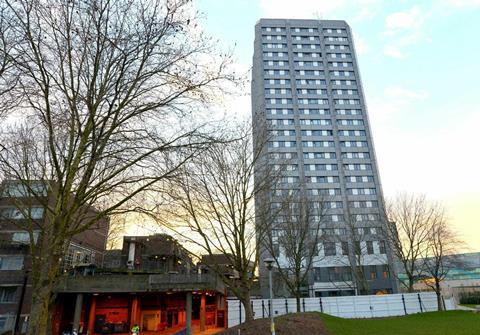Rydon tells inquiry that makers of dangerous cladding materials had been ‘assisted’ in getting their products to market
A “slack and complicit” testing and certification industry should take more blame for allowing combustible materials to be fitted to Grenfell tower than the project team which worked on the block’s disastrous refurbishment, the inquiry into the fire has heard.
Marcus Taverner QC, representing main contractor Rydon, said that testing houses and certifying bodies had given “assistance” to manufacturers of dangerous cladding products to exploit an “inadequate regulatory regime”.
The inquiry has already found that the ACM cladding panels manufactured by Arconic were the “primary cause” for the rapid spread of flames up the side of the tower in the June 2017 fire which claimed 72 lives. The inquiry also found that the insulation products manufactured by Kingspan and Celotex had “more likely than not” contributed to the spread of flames.

In his closing statement for the modules of the inquiry looking into the refurbishment of the tower and the materials which were used, Taverner argued that the role played by the manufacturers of the cladding products and the testing and certifying bodies could not be ignored.
He said that “inadequately drafted regulations and guidance” and product manufacturers’ “cynical and cavalier approach to the serious risks posed by their products” were the main causes of the tragedy.
However, the inquiry heard last year that a consultant advising the client for the refurbishment had complained that he had never “worked with a contractor operating with this level of nonchalance”.
In a 2016 email, Neil Reed of Artelia Projects told a colleague that Rydon’s refurbishment was “becoming a farce” after the contractor removed staff off the project in the run-up to completion.
And Rydon contracts manager for the project Simon Lawrence admitted it should have hired more design expertise when asked what he would have done differently in hindsight.
But Taverner said the role played by Rydon in the causes of the fire was less important than that played by others.
Listing the factors which led to the fire in a “logical order”, he put building regulations in first place, followed by “dishonest” product manufacturers “intent on marketing what they knew to be dangerous material for inappropriate use”.
Taverner said the next highest share of the blame should be given to the testing and certification industry, which he said had wrongly headlined combustible materials as safe for use above 18 metres.
Finally, he listed an “alarming widespread ignorance” of the dangers of those products due to “poor professional education and dissemination to the right people of reliable information”.
The fact that identical or similar materials had been installed in hundreds of other buildings across the UK and worldwide was evidence that these four factors were the “root cause” of the disaster, Taverner added.
He highlighted Judith Hackitt’s interim report into the fire, which concluded that building regulations and guidance was “too complex and unclear”.
The report said that the rules could lead to “confusion and misinterpretation in their application to high-rise and complex buildings”.
The inquiry has already heard how certification body the British Board of Agrement had renewed a certificate for Arconic’s combustible ACM panels, which were used in the tower’s cladding system, based on information on the supplier’s website.
The certificate, which marked the panels as safe for use above 18m, was renewed by the BBA after Arconic had ignored at least 11 requests for new information over more than a year which would affect the fire rating of the certificate.
Arconic never told the BBA that the fire rating of the Reynobond PE panels had been downgraded by a French testing house in 2014, meaning they were deemed unsafe for use above 18m.
The BBA only became aware of the new test data when contacted by BBC journalist in 2018, a year after the fire.
Stephanie Barwise QC, representing some of the bereaved, called the BBA a “hopelessly weak institution” on Monday.
She said the body was “too willing to please commercial clients at the expense of ensuring appropriate safety standards”.
BBA chief scientific officer John Albon admitted to the inquiry earlier this year that the BBA’s failure to insist on the information from Arconic was “a very basic failure of due diligence”.
But he added that the body’s procedure had not anticipated “deliberate misrepresentation of the performance of the product with a fire safety-critical aspect of performance such as this”.
The inquiry has also heard how Arconic manager Claude Wehrle warned colleagues two years before the fire that Reynobond PE was “dangerous” and should be swapped for a safer fire-retardant version “as a matter of urgency”.
And the firm was warned as early as 2007 that the panels could be deadly after marketing manager Gerard Sonntag attended an industry event where a cladding expert had said that 5,000m2 of ACM would have the same “fuel power” as a “truck of 19,000-litre oil” in the event of a fire.
The next module of the inquiry will focus on how central and local government responded to the disaster.




























No comments yet